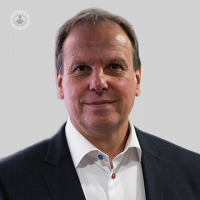How do I know if a rhinoplasty will make me happy?
Written by:Getting a nose job is a big investment, so how do you know if it’s right for you? How do you know if it’ll improve your confidence, or your social life? Can anyone predict the future in this way? Expert rhinoplasty surgeon Mr Charles East explains how his clinic does it, and why it’s transforming the way patients are treated…

It’s commonly said that we often don’t know what will make us happy. When we get what we want – especially something we’ve worked towards for a long time – it can sometimes fail to meet our expectations. On the other hand, life can equally be full of surprising joys. It’s hard to predict our happiness in advance.
This is a fact of life that rhinoplasty surgeons are all too aware of. Over many years we’ve developed increasingly sophisticated ways to simulate how a patient’s nose will look after a rhinoplasty procedure, to help us plan treatment with the patient and set expectations. Yet patients are still surprised by what they like about their nose after surgery, and the extent to which the procedure has affected their self-esteem.
It’s important to be in control as a patient, because a rhinoplasty is no small investment. You want to know what to expect, and whether a rhinoplasty will be worth it in retrospect. But is there a way of predicting how you’ll feel, aside from travelling to the future to read your mind?
We may not have a crystal ball – but we do have the Face-Q scales.
What are the Face-Q scales?
The Face-Q scales are a set of questionnaires we carry out in the clinic with everybody who undergoes a rhinoplasty surgery. Rather than just comparing before and after photographs, we carry out two surveys, one before the procedure and one afterwards.
Before the procedure we’ll ask you:
- how satisfied you are currently with your nose’s appearance
- how your nose affects your confidence socially
- how your nose affects your self-image
- how you expect the rhinoplasty will affect you, such as feeling like you will fit in, or new people wanting to get to know you
After the procedure we’ll ask you again about your satisfaction with your nose’s appearance, as well as how you now feel socially.
How is this useful?
It’s always useful for each patient to be able to compare how they felt before and after their rhinoplasty, and see the difference it has made. However, by looking at all of the questionnaires our patients have completed, we’ve started to spot trends.
For example, we now know that while rhinoplasty can make a huge difference to how you feel about your nose’s appearance, dramatic improvements in your social confidence or general self-esteem are less common. We can work with you to set realistic expectations about your surgery and help you make a more informed choice about treatment.
The questionnaires also demonstrate that how you feel about your nose before the procedure can affect how you’ll feel after the procedure. Body dysmorphia (also known as body dysmorphic disorder or BDD) is a growing problem in the UK, and for some patients rhinoplasty won’t provide a solution to problems with self-esteem. Using the insights from the Face-Q scales, we can conduct proper screening and ensure that we only recommend a rhinoplasty to patients who will really benefit from it.
Finally, there are many ways to carry out a rhinoplasty surgery, but so far we’ve been lacking knowledge on which technique really leaves our patients the most satisfied. The Face-Q scales show that the right technique actually depends on the patient and the problems they want to address. With this knowledge we can tailor our treatments more effectively for all of our patients.
God only nose what we’d do without Q
The Face-Q scales are the best effort so far to really predict how patients will feel after their rhinoplasty, and we’re starting to see them in use across more and more clinics in the UK.
This is great news for patients, because in the past the decision to have a nose job was a bit of a leap of faith. Now, a good conversation with an experienced rhinoplasty surgeon can take away some of this guesswork and help you make the right choice.


